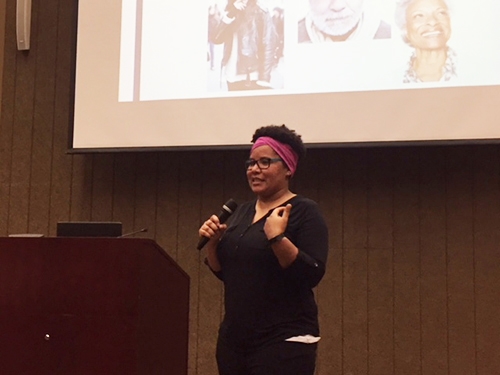Doctoral Student Expands Knowledge of Racial Microaggressions

Kendra Shoge speaks about her research into racial microaggressions to students and parents at ABC Adolescent Center in Little Rock.
Overt acts of racism often start with small acts, what may seem like innocuous expressions of dislike or rude behavior.
Kendra Shoge, a University of Arkansas third-year doctoral student in counselor education, studies these small acts that carry the clinical description of racial microaggressions and plans to write her dissertation on the topic.
Shoge has a bachelor's degree in psychology and a master's degree in clinical mental health counseling, both from Missouri State University in Springfield. She grew up in a rural town of 2,000 people and very little diversity southwest of Springfield.
She defined the term "racial microaggression" as racially motivated insults or slights that can come in several forms. Because of others' words or actions, people may feel invisible, like a foreigner, or like their particular race is undesirable. Other microaggressions include assuming criminal behavior, creating environmental invalidation such as offensive graffiti and oversexualizing someone because of their race, Shoge said. Some are unintentional.
"I can identify because I have seen and experienced microaggressions," she said. "A microaggression sends the message that you don't belong here."
For her master's thesis at Missouri State, Shoge surveyed undergraduates about whether they had experienced microaggressions and the stress that caused.
"It happened all the time and the stress was pretty significant," she found.
She plans to expand into qualitative research for her dissertation by conducting long interviews with students. The other published research she found while working on her dissertation topic is mostly quantitative and there isn't much in the South, Shoge said.
On Nov. 21, Shoge spoke to a group of about 60 parents and students between the ages of 14 and 18 at the ABC Adolescent Center in Little Rock at the invitation of Raina Porchay, director of the center. It gave Shoge the opportunity to educate people about microaggressions.
"Naming it helps you cope with it," she said. "I asked people to share examples. We talked about resilience and what that means. I told them that it may help to talk with their parents and other family members about where they came from and to get engaged and involved in their communities."
Shoge also talked about learning how to have conversations with people about the ways they convey messages.
"I talked about how to educate people (who commit macroaggressions) so they understand what they are doing," she said.
Porchay said Shoge was the first in what she hopes will be a series of speakers to be part of an African-American history studies program.
The center provides an after-school program for middle school to high school students who are facing challenges in various areas, whether academic, social, emotional or financial. These at-risk students may be participating in gangs, been involved in drug abuse or suffered sexual abuse, Porchay said. Ninety-seven percent of students who take part in the center's activities are African-American, she said.
"We want to have more than just one month of African-American history," she said. "We want to build it into our curriculum year-round. We want our students to understand the importance of words and actions, who they are and where they came from."
The session with Shoge ran over the allotted time and several students stayed after her presentation to continue speaking with her, Porchay said.
The students learned about the roles they play in microaggressions, whether as victim or perpetrator, said her husband, Bobby Porchay.
"Some of the kids opened up and voiced what they had experienced as far as microaggressions and when they had unconsciously insulted others," he said. "These kids may have seen news and events on social media, but Kendra was able to explain to them what was going on. Kids see it and talk amongst themselves but, when someone who studies the topic is there to talk with them, they have an aha moment. What ends up happening is they become more conscious of everyday conversation, and it improves their ability to think critically."
Topics
Contacts
Heidi S. Wells, director of communications
College of Education and Health Professions
479-575-3138,
heidisw@uark.edu
Headlines
PetSmart CEO J.K. Symancyk to Speak at Walton College Commencement
J.K. Symancyk is an alumnus of the Sam M. Walton College of Business and serves on the Dean’s Executive Advisory Board.
Faulkner Center, Arkansas PBS Partner to Screen Documentary 'Gospel'
The Faulkner Performing Arts Center will host a screening of Gospel, a documentary exploring the origin of Black spirituality through sermon and song, in partnership with Arkansas PBS at 7:30 p.m. Thursday, May 2.
UAPD Officers Mills and Edwards Honored With New Roles
Veterans of the U of A Police Department, Matt Mills has been promoted to assistant chief, and Crandall Edwards has been promoted to administrative captain.
Community Design Center's Greenway Urbanism Project Wins LIV Hospitality Design Award
"Greenway Urbanism" is one of six urban strategies proposed under the Framework Plan for Cherokee Village, a project that received funding through an Our Town grant from the National Endowment for the Arts.
Spring Bike Drive Refurbishes Old Bikes for New Students
All donated bikes will be given to Pedal It Forward, a local nonprofit that will refurbish your bike and return it to the U of A campus to be gifted to a student in need. Hundreds of students have already benefited.




